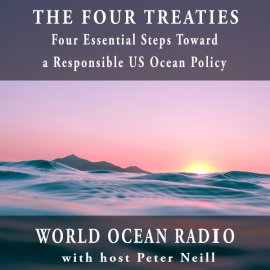The Four Treaties
-
English
-
ListenPause
FOUR TREATIES
Four Essential Steps toward a Responsible US Ocean Policy[intro music]
I’m Peter Neill, Director of the World Ocean Observatory.
International agreements are imperative if we are to pursue international solutions to international environmental policy, regulation, redress, and sustained natural resources as natural capital for the future. The recent return by the United States to the Paris Climate Agreement is a significant case in point as a symbol and reality for international goals and cooperative actions to address greenhouse gas, increased temperatures, and other human-impacts on climate, affecting us all worldwide in almost every aspect of our lives.
But there are four other, major environmental treaties that pertain even more directly that the US has failed to ratify, without which the Paris action is but a gesture, a best intention without necessary action to assure a successful outcome. For this edition of World Ocean Radio, I am relying on a simple, but extremely important article by Tara Lohan, in The Revelator (therevelator.org), an insightful on-line aggregator of environmental news, and an initiative of the Center for Biological Diversity, that I heartily recommend for “wild, incisive, and fearless” coverage of the most important environmental issues.
The treaties are as follows:
First, the United Nations Convention of the Law of the Sea, a framework for managing and protecting the ocean, ratified by 167 nations and the European Union, the United States excepted with the exception of the US that has rejected its structure as an intrusion on national sovereignty, in contradiction of the integration of ocean challenges for the benefit of other nations, worldwide.
Second, the Convention on Biological Diversity, an international framework for the conservation of biological diversity, sustainable use of natural components, protection against species extinction, and equitable sharing of benefits that arise from genetic resources. The US is the only member of the United Nations that has not signed on to this critical tool for the protection of Nature from indiscriminate extraction, exploitation, and destruction.
Third, the Stockholm Convention on Persistent Organic Pollutants, a framework for protecting global public health y controlling the disposal of harmful chemicals that migrate through the air and ocean as enduring poison circulating invisibly worldwide affecting habitat, species, and coastal communities.
Fourth, the Basel Convention on the Control of Transboundary Movements of Hazardous Wastes and their Disposal, that limits the transport of waste between countries, to include vast volumes of unrecycled household, plastic waste, radioactive materials, toxic computer components, mining, fracking, and industrial by-products, and other materials that we are unwilling to address in our own backyard.
These represent an effort by the international community of nations to address these problems through controls and regulations standards for storage and disposal, protections for all forms of life on Earth, and the necessary collaborations to deal with solutions for these man-made problems for the common good.
That the United States has failed to ratify these agreements is a travesty, a national disgrace, an abdication of our responsibility as a world leader, in favor of the most, narrow, predictably financial interests. Treaties are ratified by the Senate, and since the Reagan era, a small minority, often backed by corporate donations, influenced by lobbyists, has consistently opposed ratification and isolated us in an almost unique position outside the world community.
The ocean is integral to all these challenges. It encompasses and integrates the public interest in every way, as a global environment, as host to fecund biodiversity, as system of distribution for food, weather, toxins and waste. Each of these Treaties pertains directly to the health and protection of our natural world, to species survival on land and sea, to beneficial economic exchange, to political and social inter-action, to personal and social security, and to the prospect for international peace and benefit for all mankind. Each of these treaties should be addressed and ratified now.
We will discuss these issues, and more, in future editions of World Ocean Radio.
[outro music]
Four Essential Steps toward a Responsible U.S. Ocean Policy
International agreements are essential if we are to sustain natural resources as natural capital for our future. In this episode of World Ocean Radio we outline four major environmental treaties the United States never ratified—but should.
About World Ocean Radio
Since 2009, World Ocean Radio is a weekly 5-minute podcast covering a broad spectrum of ocean issues from science and education to advocacy and exemplary projects. World Ocean Radio, a project of the World Ocean Observatory, is available for syndicated use at no cost by college and community radio stations worldwide. Contact director@thew2o.net if you are interested in becoming an affiliate or know of a radio station that should be broadcasting these episodes each week.
Resource from This Episode
"4 Major Environmental Treaties the U.S. Never Ratified--But Should"
by Tara Lohan, The Revelator (therevelator.org)
- Login to post comments



